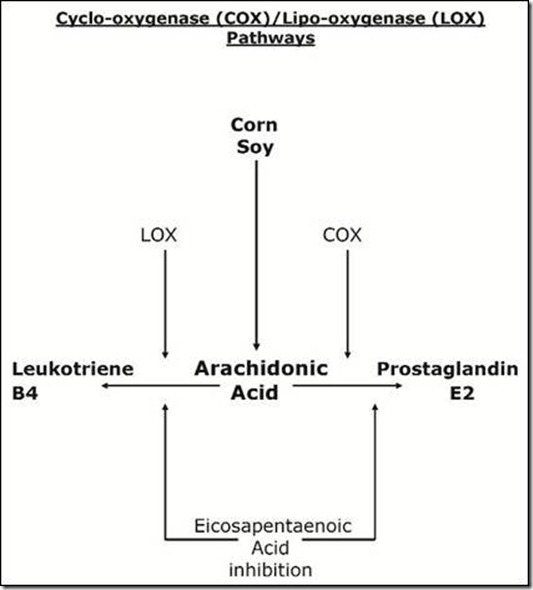Omega-3 Fatty Acids for Neuropathic Pain
 Monday, July 12, 2010 at 8:26AM
Monday, July 12, 2010 at 8:26AM Dan Murphy, DC—
Private Practice of Chiropractic;
Diplomate American Board of Chiropractic Orthopedist;
Faculty Life Chiropractic College West;
Vice President ICA 2003-2009;
ICA Chiropractor of the Year 2009
INTRODUCTION
Pain is an electrical signal interpreted by one’s brain. Neuropathic pain is a chronic pain state that usually (but not always) is caused by some sort of tissue trauma. In neuropathic pain, the nerve fibers themselves are often damaged, dysfunctional or injured. These damaged nerve fibers send incorrect electrical signals to the brain’s pain centers.
Inflammation alters the threshold of the pain receptors and nerve fibers. Consequently, it is easier for pain nerves that are inflamed to generate the electrical signal that the brain interprets as pain.
Omega-3 fatty acids, especially the molecule eicosapentaenoic acid (EPA) found in fish oil, has powerful anti-inflammatory influences through several different mechanisms, including the reduction of pro-inflammatory cytokines. Omega-3 fatty acid supplementation has been shown to reduce the chronic pain associated with degenerative spinal disease (Maroon).
Earlier this year (2010), researchers from the University of Toronto, Canada, published a case series of patients suffering from neuropathic pain syndromes, who were treated with high doses of omega-3 fatty acids from fish oil (Ko). The abstract from this study makes the following points:
Objective-- The aim of this case series study was to investigate and report on patients with neuropathic pain who responded to treatment with omega-3 fatty acids.
Methods-- Five patients with different underlying diagnoses including cervical radiculopathy, thoracic outlet syndrome, fibromyalgia, carpal tunnel syndrome, and burn injury were treated with high oral doses of omega 3 fish oil (varying from 2400-7200 mg/day of EPA + DHA).
Outcome measures were obtained pre-treatment and post-treatment. These included validated surveys (short-form McGill Pain questionnaire, DN4 neuropathic pain scale, Pain Detect Questionnaire), objective clinical tools (Jamar grip strength, Lafayette dynamometry, tender point algometry) and EMG Nerve Conduction studies.
Results-- These patients had clinically significant pain reduction, improved function as documented with both subjective and objective outcome measures up to as much as 19 months after treatment initiation.
No serious adverse effects were reported.
Conclusions-- This first-ever reported case series suggests that omega-3 fatty acids may be of benefit in the management of patients with neuropathic pain.
Figure 1.
DISCUSSION From Dr. Murphy
In my review of this article, I found these to be the Key Points:
1. The benefits of omega-3 fatty acid supplementation are well documented in the literature for the prevention and management of a wide variety of health conditions including: Inflammatory joint pain, Chronic spinal pain, Autoimmune disease, Cardiovascular disease, Depression, Fibromyalgia syndrome.
- The probable mechanism for the benefit of omega-3 supplementation in the treatment of inflammatory pain is through the suppression of the pro-inflammatory eicosanoids (Prostaglandin E2 [PGE2], Leukotriene B4 [LTB4]).
- This is the first study to assess the use of omega-3 supplements in the treatment of neuropathic pain. Neuropathic pain can exist in the absence of pro-inflammatory eicosanoids. Rather, neuropathic pain is linked to pro-inflammatory cytokines (proteins made by immune system cells).
4. These authors present 5 case studies on chronic neuropathic pain patients with excellent results. The patients were treated with high oral doses of omega 3 fish oil (varying from 2400-7200 mg/day of EPA + DHA).
a. Results were excellent both subjectively and objectively for all five, which included: Cervical radiculopathy, Thoracic outlet syndrome, Fibromyalgia, Carpal tunnel syndrome, Burn injury.
- No serious adverse effects were reported from taking high oral doses of omega-3 fish oil (varying from 2400-7200 mg/day of EPA + DHA).
- Patients taking Coumadin (or other blood thinners) should slowly begin to take omega-3s while monitoring clotting times.
- Because of the blood thinning effects of omega-3s, patients should stop taking them 2 weeks prior to surgery, dental work, or invasive procedures such as a colonoscopy.
- Patients taking omega-3s should have their blood analyzed for the arachidonic acid (omega-6) (AA) / eicosapentaenoic acid (omega-3) (EPA) ratio. (AA/EPA)
- “An optimal [AA/EPA] ratio for cardiovascular health is 1.5/1 to 3/1.”
- The lab analysis of [AA/EPA] is especially important if the patient is taking more than 7,500 mg of EPA + DHA per day.
- “An AA/EPA ratio of 0.5/1 is associated with an increased risk for hemorrhagic stroke.”
- Fish oils should be purified.
- “A recommended conservative dose is 2,700 mg of EPA + DHA. However, a more aggressive approach for more severe pain can be up to 7,500 mg of EPA + DHA. This will require serum laboratory tests to monitor AA/EPA ratio.”
- “Patients should clearly be instructed to take only omega-3 and not omega-3 to omega-6 to omega-9 products. The omega-6 fatty acids are pro-inflammatory and the use of such products will not help in relieving pain.”
- Pain patients must also reduce their intake of arachidonic acid (omega-6) (AA), which is commonly found in red meat and fried foods.
- The conversion of alpha linolenic acid (ALA) (plant omega-3) to the anti-inflammatory EPA omega-3 is enhanced with adequate levels of vitamin B6, magnesium, and zinc.
- The conversion of alpha linolenic acid (ALA) (plant omega-3) to the anti-inflammatory EPA omega-3 is impaired by trans fats and caffeine.
- “To conclude, the use of omega-3 fatty acid supplements for the treatment of neuropathic pain shows promise, on the basis of these case studies.”
References
1. Maroon JC, Bost JW; Omega-3 Fatty acids (fish oil) as an anti-inflammatory: an alternative to nonsteroidal anti-inflammatory drugs for discogenic pain; Surgical Neurology; 65 (April 2006) 326– 331.
2. Ko GD, Nowacki NB, Arseneau L, Eitel M, Hum A; Omega-3 Fatty Acids for Neuropathic Pain: Case Series The Clinical Journal of Pain; February 2010, Vol. 26, No, 2, pp 168-172.
 CBP Seminars | Comments Off |
CBP Seminars | Comments Off | 




